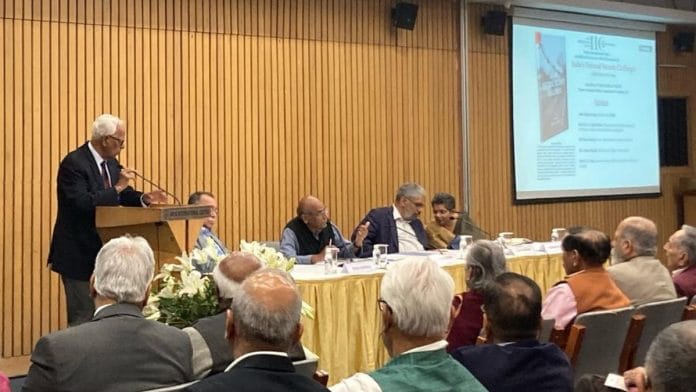New Delhi: Former Jammu and Kashmir governor N. N. Vohra has warned that the prolonged “interface” between the Indian Army and civilian and political issues will lead to huge problems for the military, which is already facing a number of “critical imbalances”.
“Since 1947, we’ve had multiple wars with Pakistan. We saw 1948, the 1965 war, the 1971 Liberation of Bangladesh, 1999 at Kargil. I must say that the Ministry of Defence in the years received very poor budgets,” said Vohra. He was speaking at a discussion on his book India’s National Security Challenges (2023) at Delhi’s India International Centre (IIC).
“There has been no collective long-term thinking, which had led to critical imbalances,” the former governor said, adding that the “single service approach” of the armed forces has led to a number of issues, including the “duplication of positions”.
“In our own immediate neighbourhood, we have been unlucky. The Line of Control with Pakistan is not a peaceful border. China has been creating problems across the Line of Actual Control in the last seven years. These increasing threats on the frontiers coupled with our homeland problems are together to be viewed as what we should be worried about.”
Vohra said India is also facing a number of challenges internally, from Left-Wing Extremism in the heart of the country to issues in the Northeast, some of which have been ongoing since before Independence. In the past, India also witnessed a security situation in Punjab, which received funding from Pakistan’s Inter-Services Intelligence (ISI), he further said, while the situation in Jammu and Kashmir has been similar to a “proxy war” over the last three decades.
“ISI has been active for a while spreading extremism and radicalism. Continuing disorders with enormous economic and human losses retard growth. The absence of peace, normalcy and public order leads to economic disturbances,” said Vohra.
The former J&K governor was joined on the panel by C. Raja Mohan, visiting professor at the National University of Singapore’s Institute of South Asian Studies, Ananta Centre CEO Indrani Bagchi, and Rana Banerji, former special secretary at the Cabinet Secretariat. The session was moderated by IIC president and former foreign secretary Shyam Saran.
Both Vohra and Mohan called attention to how state governments have to reach out to the Union Ministry of Home Affairs (MHA) for every law and order issue, instead of using their own resources as envisaged by the Constitution.
“Excessive dependence on MHA to ask for help for the smallest of problems. MHA has CAPF, but their strength is not strong enough for when to handle multi-front issues,” said Vohra.
“Prolonged deployments of the army in good strength eroded the infantry element of the Army. The prolonged interface with civilian problems and political issues, which leads to huge problems.”
Also Read: Israel’s border defence collapse should make India think how it manages LOC in Kashmir
‘Complacency in New Delhi’
Mohan said New Delhi has witnessed a growing complacency, with the belief that it is in a “sweet spot” and that this will continue as nations around the world come to India due to its size and developing economy. “I think that assumption [India is in a sweet spot] is under-questioned today. If you just look at the 40 days of (Donald) Trump’s presidency (in the US), it shows that the global order is in a churn. Great global changes will have challenges to internal security.”
He further said that there was a “reluctance to change” India’s setup, which could be an impediment in handling challenges that arise from both internal and external security threats.
“There is this culture where we believe we do not need to change anything. It is good enough. The reluctance to change, the reluctance to reflect on a decision taken 70 years ago. If you don’t change internally, then your ability to answer external challenges are impacted,” said Mohan.
“The states have no incentive to fulfil their own constitutional responsibilities and kick the ball to the Centre and, I think, if you don’t change this, you will be in more trouble in the future.”
In addition to this, the panellists said, India is facing several security threats at its frontiers. The Durand Line, which separates Pakistan from Afghanistan has seen a growing number of security situations in recent months.
There has been a surge in attacks in Pakistan’s western provinces, which has led to Islamabad blaming Afghanistan for sheltering groups including the Tehreek-e-Taliban Pakistan (TTP). The situation has remained tense with the two countries even closing border crossing points in the last week.
“What happens in Peshawar will have an impact on Lahore, and what happens in Lahore will have an impact on New Delhi,” said Mohan. But if the situation in Pakistan is tense, India’s Eastern border has numerous challenges due to the civil war in Myanmar. All of this adds an urgency to military procurement, which, Mohan said, needs immediate reforms.
From the Stuxnet virus, which impacted Iran’s nuclear programme, to the growing vulnerability of consumer technologies to attacks, Bagchi warned that security threats are increasingly cyber threats.
“We need to take into account the cross-domain character of security challenges. We are also looking at what has become an asymmetrical nature of warfare,” said Saran.
(Edited by Sanya Mathur)
Also Read: 75% cross-border drones BSF shot down in Amritsar in last 4 years were launched from Lahore






